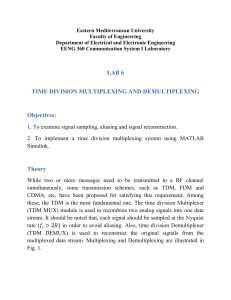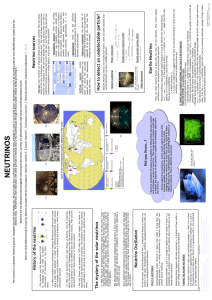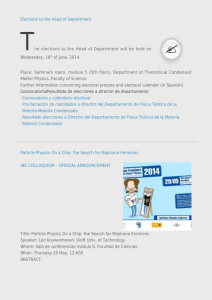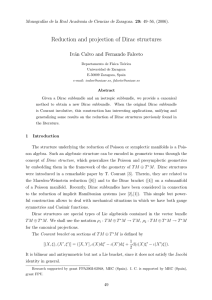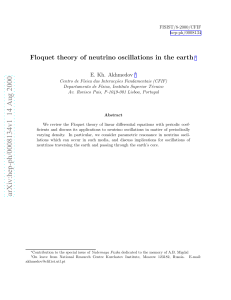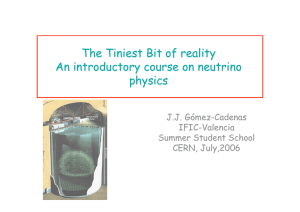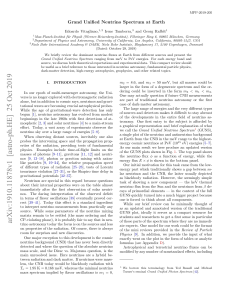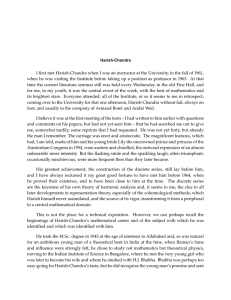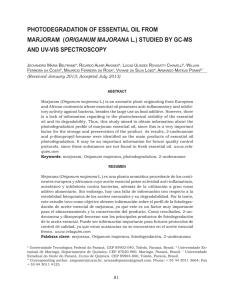Toroidal Dipole Moment of a Massless Neutrino
Anuncio
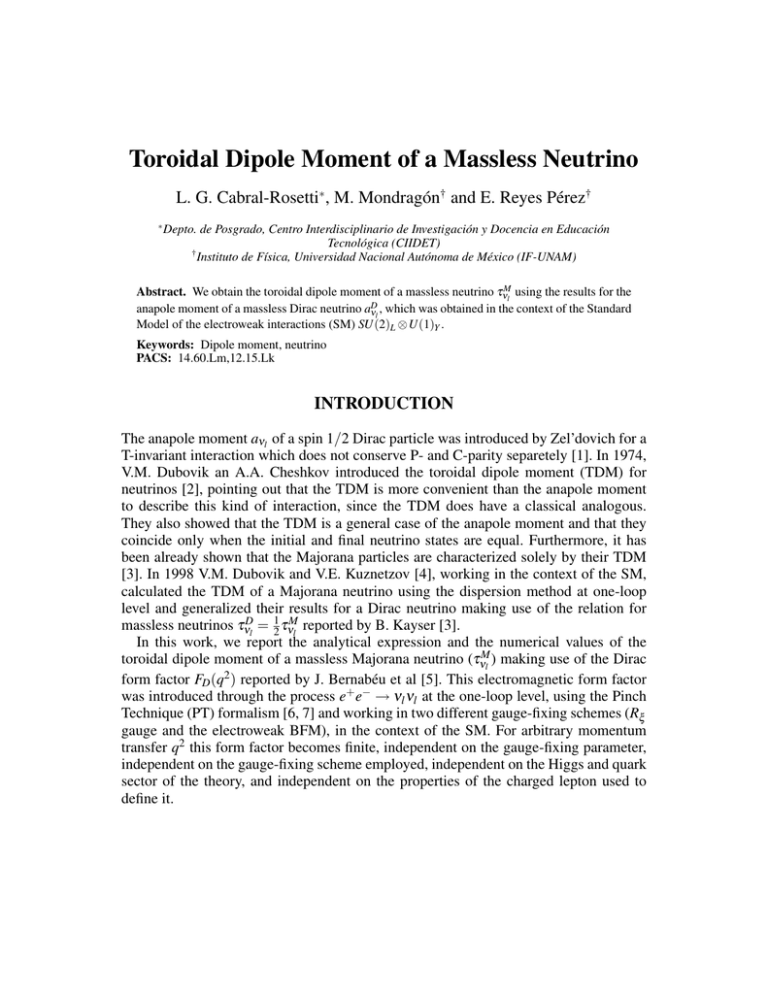
Toroidal Dipole Moment of a Massless Neutrino L. G. Cabral-Rosetti∗ , M. Mondragón† and E. Reyes Pérez† ∗ Depto. de Posgrado, Centro Interdisciplinario de Investigación y Docencia en Educación Tecnológica (CIIDET) † Instituto de Física, Universidad Nacional Autónoma de México (IF-UNAM) Abstract. We obtain the toroidal dipole moment of a massless neutrino τνMl using the results for the anapole moment of a massless Dirac neutrino aD νl , which was obtained in the context of the Standard Model of the electroweak interactions (SM) SU(2)L ⊗U(1)Y . Keywords: Dipole moment, neutrino PACS: 14.60.Lm,12.15.Lk INTRODUCTION The anapole moment aνl of a spin 1/2 Dirac particle was introduced by Zel’dovich for a T-invariant interaction which does not conserve P- and C-parity separetely [1]. In 1974, V.M. Dubovik an A.A. Cheshkov introduced the toroidal dipole moment (TDM) for neutrinos [2], pointing out that the TDM is more convenient than the anapole moment to describe this kind of interaction, since the TDM does have a classical analogous. They also showed that the TDM is a general case of the anapole moment and that they coincide only when the initial and final neutrino states are equal. Furthermore, it has been already shown that the Majorana particles are characterized solely by their TDM [3]. In 1998 V.M. Dubovik and V.E. Kuznetzov [4], working in the context of the SM, calculated the TDM of a Majorana neutrino using the dispersion method at one-loop level and generalized their results for a Dirac neutrino making use of the relation for massless neutrinos τνDl = 21 τνMl reported by B. Kayser [3]. In this work, we report the analytical expression and the numerical values of the toroidal dipole moment of a massless Majorana neutrino (τνMl ) making use of the Dirac form factor FD (q2 ) reported by J. Bernabéu et al [5]. This electromagnetic form factor was introduced through the process e+ e− → νl νl at the one-loop level, using the Pinch Technique (PT) formalism [6, 7] and working in two different gauge-fixing schemes (Rξ gauge and the electroweak BFM), in the context of the SM. For arbitrary momentum transfer q2 this form factor becomes finite, independent on the gauge-fixing parameter, independent on the gauge-fixing scheme employed, independent on the Higgs and quark sector of the theory, and independent on the properties of the charged lepton used to define it. ANALITICAL EXPRESSION AND NUMERICAL EVALUATION OF THE TDM OF A MASSLESS NEUTRINO The matrix element of the electromagnetic current of a massless Dirac neutrino in the framework of the SM can be expressed at the lowest order in α, for all q2 , where q = p − p0 , in terms of only one form factor FD (q2 )[8, 9]: Mµ = FD (q2 )ūνl (p0 )γµ (1 + γ5 )uνl (p). (1) In Fig. 1, we draw the only two one-loop proper vertex diagrams, which contribute to the Dirac form factor in the electroweak Background Field Method (BFM), in the ’t Hooft-Feynman gauge [5]. It can been shown that 1 2 r , (2) 6 νl and therefore the anapole moment of the neutrino is related to the Dirac form factor as follows [10] fD (q2 ) ∂ fD (q2 ) aνl ≡ f3 (0) = =− , (3) q2 q2 =0 ∂ q2 q2 =0 aνl = where f3 is the anapolar form factor. According to the results given for FD (q2 ) in [10], 2 αe 1 MW 2 02 2 2 02 2 FD (q ) = − + B (q ; m m ) − B (q ; M M ) 1 + 0 0 W W l l 2 2 q2 8πsW 2 2 )2 MW (q2 + MW 2 02 02 2 2 2 02 02 2 C0 (0, q , 0; MW ml ml ) , (4) +MW 2 + 2 C0 (0, q , 0; ml MW MW ) + q q2 2 we conclude that the anapole moment of the neutrino is a physical quantity, which only gets a contribution from the proper neutrino electromagnetic vertex. Taking into account the relations among scalar, two and three points Passarino-Veltman functions reported in [9, 10], we get 2 ml GF D 3 − 2 log aνl = √ . (5) 2 MW 24 2π 2 Using the relation for massless neutrinos τνDl = 12 τνMl [3] and the fact that in this case τνl = aνl (i.e. the initial and final states of the neutrino are the same) [4], we get 2 ml GF M aνl = √ 3 − 2 log . (6) 2 2 MW 12 2π The numerical evaluation of the above expression for the three different neutrino species yields Figure 1. Only two proper vertex diagrams contribute to the neutrino charge radius rν2l and, therefore, to the neutrino anapole form factor f3 (q2 ) at the one loop level after the massive gauge cancellation, which takes place when the Pinch Technique is used in the electroweak Background Field Method. τνMe = 13.6 × 10−34 cm2 τνMµ = 8.0 × 10−34 cm2 τνMτ = 5.0 × 10−34 cm2 . CONCLUSIONS We obtained an analytical expression and calculated numerically the value of the TDM of a neutrino, using the Dirac form factor introduced by J. Bernabéu et al [5]. This form factor was obtained through the physical process e+ e− → νl νl working in the linear Rξ gauge and using the electroweak BFM in the context of the SM of the electroweak interactions at the one loop level. The numerical values for TDM of a Majorana neutrino are τνMe = 13.6 × 10−34 cm2 , τνMµ = 8.0 × 10−34 cm2 and τνMτ = 5.0 × 10−34 cm2 ; while for a Dirac neutrino the values of the TDM are half of the Majorana ones. Thus, we got that the neutrino TDM is independent on the gauge-fixing parameter and, therefore, a physical quantity. Our results differ from those presented previously by Dubovik and Kuznetsov in [4]. This work is part of a broader analysis still in progress [11]. Acknowledgements: This work was partially supported by CONACyT México under contract No. 82291, and by DGAPA-UNAM under contract PAPIIT IN112709. REFERENCES 1. 2. 3. 4. 5. 6. 7. 8. 9. Ya. B. Zel’dovich, Sov. Phys. JETP, 6, 118 (1958). V.M. Dubovik and A.A. Cheshkov, Phys. Part. Nucl., 5, 791 (1974). B. Kayser, Physical Review D, 26, 7 (1982). V.M. Dubovik and V.E. Kuznetsov, V.E, Int. J. Mod. Phys. A 13: 5257-5278 (1998). J. Bernabéu et al, Phys. Rev. D62, 113012 (2000). J.M. Cornwall, Phys. Rev. D26, 1452 (1982). J.M. Cornwall and J. Papavassiliou, Phys. Rev. D4, 3474 (1989). L.G. Cabral-Rosetti et al, Eur. Phys. J. C. 12, 633 (2000). L.G. Cabral-Rosetti, Ph. D. Thesis “Factores de Forma del Neutrino e Invariancia Gauge Electrodébil: El Radio de Carga", Departament de Física Teorica, Facultad de Fisiques, Universitat de Valencia, Estudi General, 11 December 2000, Valencia, Spain. 10. L.G. Cabral-Rosetti, et al, 2001, Dirac Neutrino Anapole Moment. Contribution to the Proceedings of the VIII Mexican Workshop on Particles and Fields of the División de Partículas y Campos de la Sociedad Mexicana de Física. 11. L.G. Cabral-Rossetti, M. Mondragón and E. Reyes Pérez. Work still in progress.
